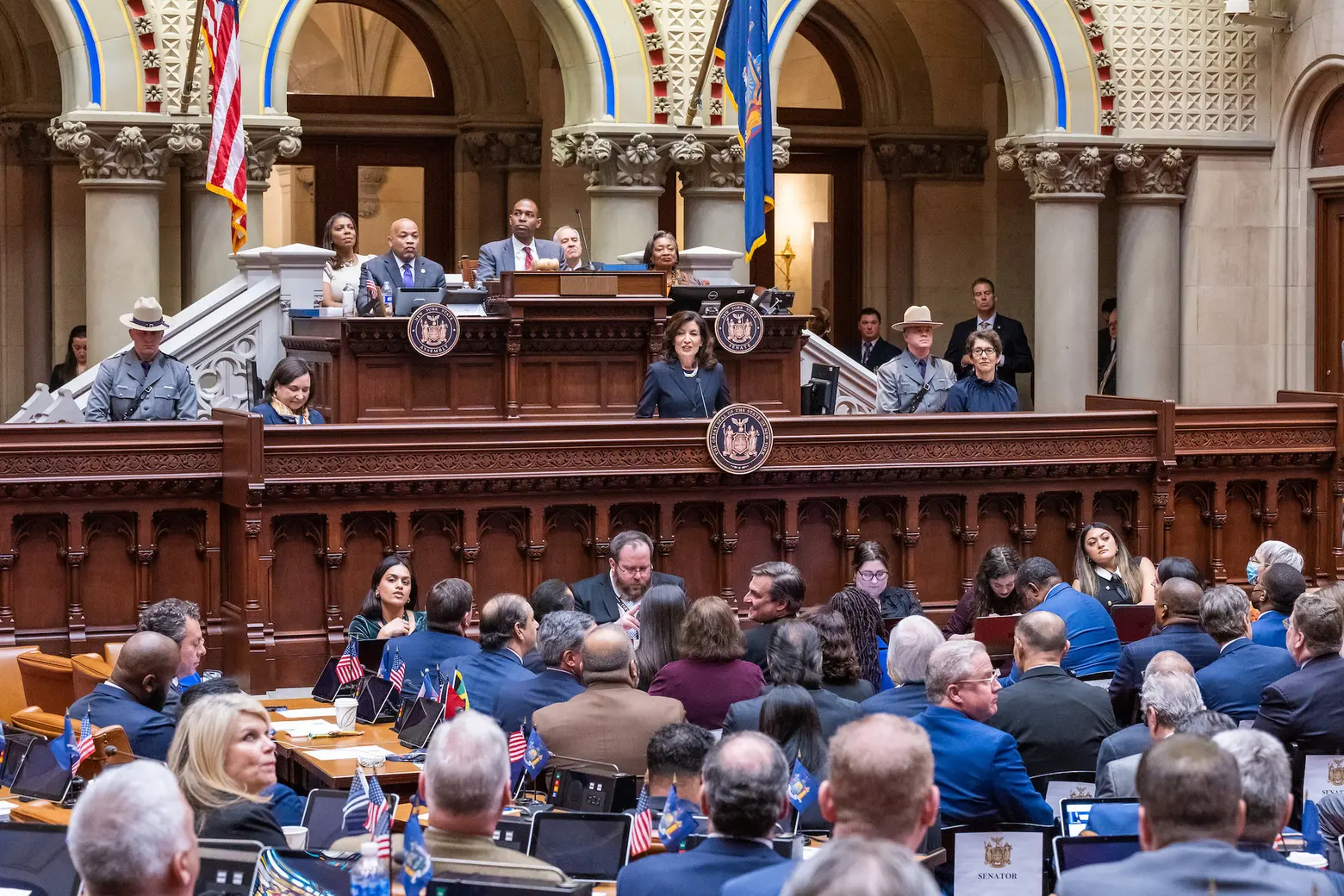New York lawmakers clash with Hochul’s housing plan in budgets

Photo courtesy of Darren McGee/Office of Governor Kathy Hochul on Flickr
The New York State Assembly and Senate on Tuesday released their budget proposals, which both deviate from the priorities of Gov. Kathy Hochul and set the stage for negotiations over the next two weeks. As first reported by City & State, the Senate’s budget discarded some of Hochul’s top goals, including the “New York Housing Compact,” a plan to build 800,000 new homes over the next 10 years to address the state’s looming housing crisis. The Senate did show support for “good cause” eviction protections and the creation of a Housing Voucher Program, two proposals omitted by the governor in the past.
Hochul introduced her Housing Compact plan during her State of the State address in January. The initiative would require all cities, towns, and villages to reach a set home creation goal every three years. The plan utilizes a mixture of zoning changes and developer incentives and requires the replacement of the 421-a property tax exemption that expired last year.
Neither the senate nor the assembly included a replacement of the tax break in their proposed budgets.
Both legislative bodies left out Hochul’s proposals to override local zoning laws that would require all municipalities within the state to increase their housing by three percent. Instead, the two chambers designated $500 million for “smart growth” programs, and an additional $500 million in incentives for municipalities that meet housing goals.
The New York Housing Conference, a nonprofit organization that advocates for affordable housing for all New Yorkers, said that the legislature’s one-house budget proposals will “keep New York unaffordable and segregated.”
“The Senate and Assembly’s proposal for optional housing growth targets for localities is a disappointing repudiation of Gov. Hochul’s bold and brave vision to overcome our housing crisis,” Rachel Fee, executive director of NYHC, said in a statement.
“This approach has not been successful in other states. By focusing on weak incentives that will not motivate local leaders to act, the Legislature has endorsed the status quo and enabled the regressive forces working to keep New York unaffordable and segregated. New Yorkers deserve better than this – and we hope the Legislature will negotiate a better outcome in the enacted budget.”
The senate did express support for including the “good cause” eviction bill, which would ban landlords from denying tenants a lease renewal without providing sufficient reasoning and cap rent increases on the majority of market-rate homes.
The one-house budget also included $250 million for the creation of a Housing Access Voucher Program, a proposal Hochul has rejected in the past.
Housing Justice for All urged the statement government to “resist the siren song of big real estate” and support “good cause” evictions and a fully funded Housing Access Voucher Program.
“The strongest pathway to protect tenants and stabilize New York neighborhoods today is the swift passage of Good Cause and the Housing Access Voucher Program in the budget,” Cea Weaver, campaign coordinator of Housing Justice for All, said in a statement.
“These measures will equip tenants with a powerful toolbox to fight for safe and decent living conditions and finally hold the state’s worst landlords to account. They will help put a roof over the heads of tens of thousands of New Yorkers who are trapped in shelters or on the streets right now. And they will keep New York safer and healthier in the long run.”
In her executive budget, Hochul proposed phasing out the use of gas and fossil fuels in new construction, which was included in both of the chamber’s budgets. The state Assembly supported Hochul’s proposal to require all new buildings built after 2026 under seven stories and all new buildings over seven stories built after 2028 to use electricity instead of gas for processes like cooking and heating.
However, the senate set a closer deadline, 2025 for buildings under seven stories and 2027 for buildings above seven stories.
The senate and assembly agreed on expanding the state’s Essential Plan to undocumented immigrants. In order for the program, which uses federal funding, to be expanded, Hochul must apply for a special federal waiver.
Both of the legislative chambers also agreed on a tax hike for the state’s top earners. Single New Yorkers earning between $5 million and $25 million would have their tax rate increase from 10.3 percent to 10.8 percent. For those making more than $25 million, the tax rate would increase from 10.9 percent to 11.4 percent.
The governor’s proposals to weaken bail reform and lift the cap on the number of NYC charter schools did not make either budget.
RELATED:





























